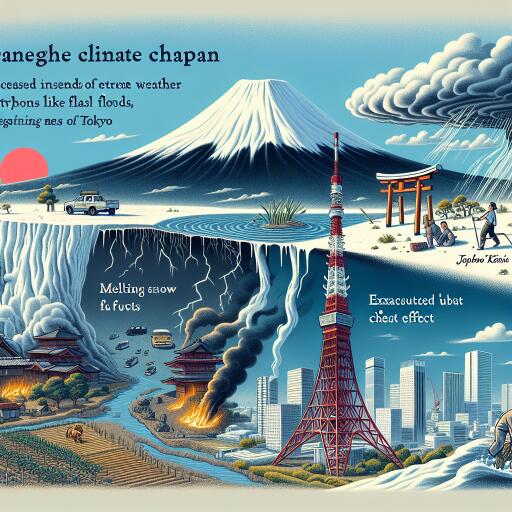
Disaster-hardened Japan Faces Enormous Costs from Climate Change
Japan, a nation well-versed in the challenges of natural disasters, continues to grapple with the escalating costs attributed to climate change. Despite Japan’s expertise in disaster preparedness and resilience, recent research indicates that the country still incurs significant economic losses. Moreover, these costs are projected to surge as climate change, largely driven by fossil fuel combustion, exacerbates natural calamities.
Over the past decade, Japan has experienced climate change-related damages amounting to ¥90.8 billion. This positions Japan among the highest in the world, trailing only behind the United States, China, and India, all of which are notably larger in both population and landmass.
Looking ahead, projections suggest even graver scenarios. Based on current global climate policies, the cumulative cost of climate damages through 2050 could skyrocket to an alarming ¥952 trillion, surpassing the total current value of Japan’s economy, which stands at ¥591.9 trillion, according to the Cabinet Office.
Having faced significant disasters—such as the Noto earthquake, Typhoon Hagibis, and the infamous March 2011 earthquake and tsunami—Japan is acutely aware of its vulnerability. Recent warnings of a potential Nankai Trough megaquake further underline the nation’s exposure to catastrophic natural events.
As a testament to its vulnerability, Japan ranks sixth on the Disaster Risk Index, a metric gauging the per capita impacts of disasters across nearly 160 nations. This ranking reflects a staggering $2.35 trillion in economic losses and casualties, against the backdrop of Japan’s 124 million populace.
Japan’s geographical characteristics, including extensive coastlines and densely populated urban centers, amplify its risk. Such geographic factors, alongside limited resources, heighten its susceptibility to disaster-related economic devastation. Strategists emphasize the necessity of investment in early warning systems and resilient infrastructure to mitigate these impacts.
The Impacts of Climate Change
Recent studies forecast a rise in extreme weather events, which will likely augment climate-related damages. A study analyzing nearly 4,000 extreme weather incidents from 2014 to 2023 estimated global economic losses of $2 trillion from such events. These results highlight the immediate, tangible effects of rising global temperatures and shifting climate patterns.
While acute events like floods and wildfires are on the rise, “chronic impacts” such as rising sea levels and extreme temperatures also threaten ecosystems and human societies. Japan’s economic losses, estimated at $90.8 billion, place it between countries like India and Germany in terms of financial impact.
Economic and Environmental Ramifications
Continued inaction on climate change could result in a nearly 10% reduction in Japan’s annual gross domestic product. Between now and 2050, this could culminate in ¥970 trillion in losses, translating to substantial financial burdens on Japanese households.
Despite these ominous forecasts, Japan has the potential to significantly reduce greenhouse gas emissions. With advancements in sectors like batteries and offshore wind energy, the country stands poised for substantial economic gains if it embraces a net-zero carbon strategy. Under such a scenario, Japan could anticipate an annual economic boost of ¥13.6 trillion by 2050 and substantial household savings compared to the current trajectory.
Insurance Costs and Climate Fund Contributions
Climate change repercussions are already impacting Japanese households, notably through increased insurance costs. Fire insurance premiums have risen repeatedly, driven by the mounting financial risks associated with natural disasters. This is attributed to climate change, further underscoring the economic burden borne by citizens.
Moreover, Japan is leading Asian contributions to international climate funds, specifically the United Nations-led Loss and Damages Fund, aimed at supporting developing nations vulnerable to climate-induced disasters. While criticisms exist regarding the adequacy of these contributions, Japan’s financial commitments reflect an acknowledgment of its responsibility and the widespread costs of climate change.
The mounting economic strain from climate change demands immediate, rigorous mitigation efforts. By championing emissions reductions and further investing in disaster resilience, Japan—and the world at large—can work towards a sustainable future, safeguarding economies and ecosystems from the burgeoning threat of climate change.





Leave a Reply